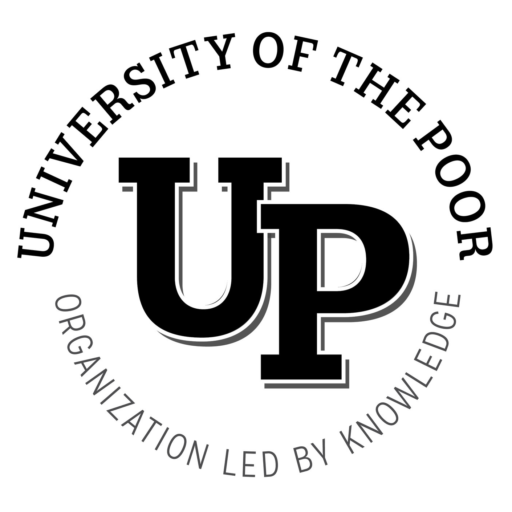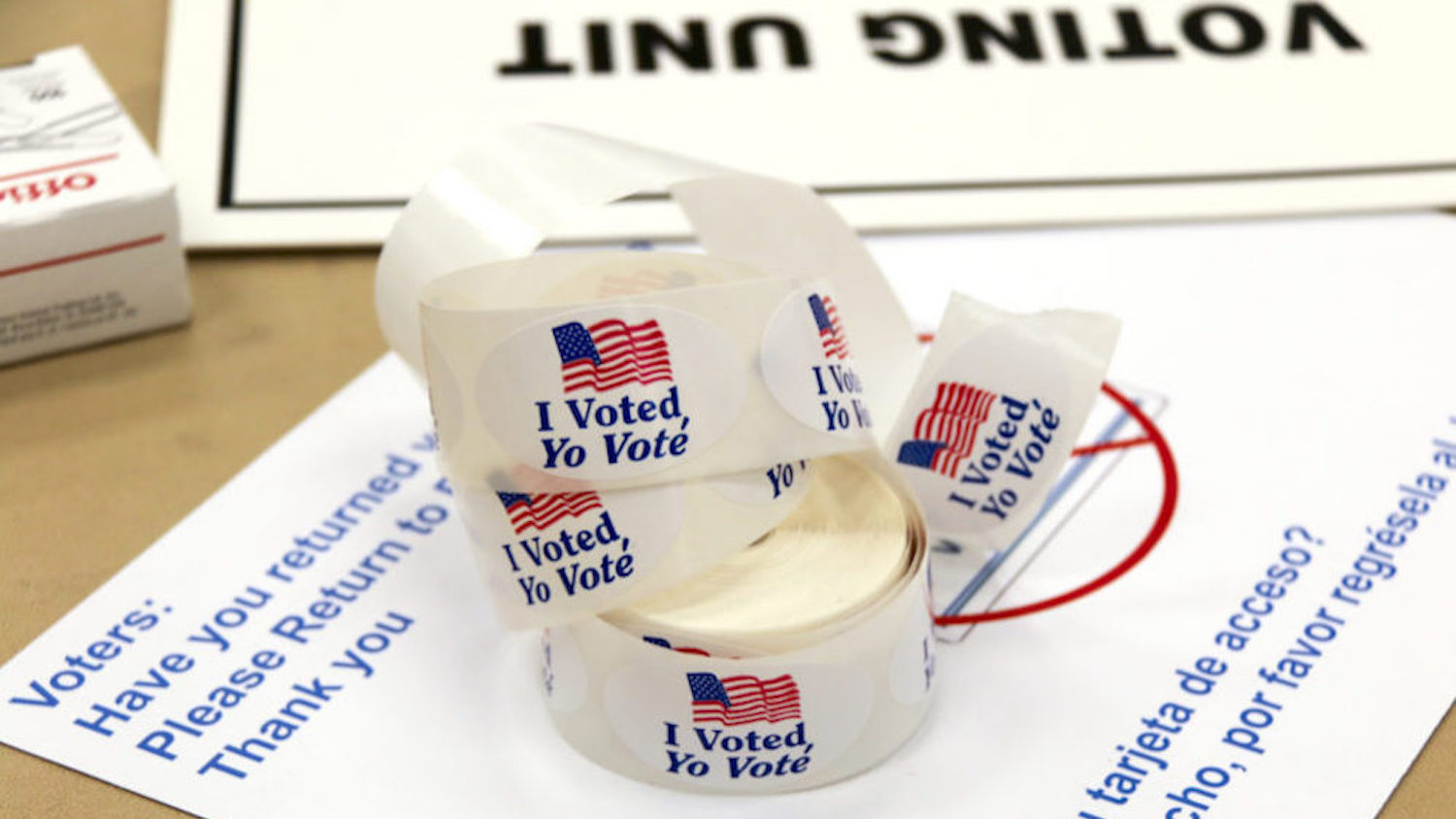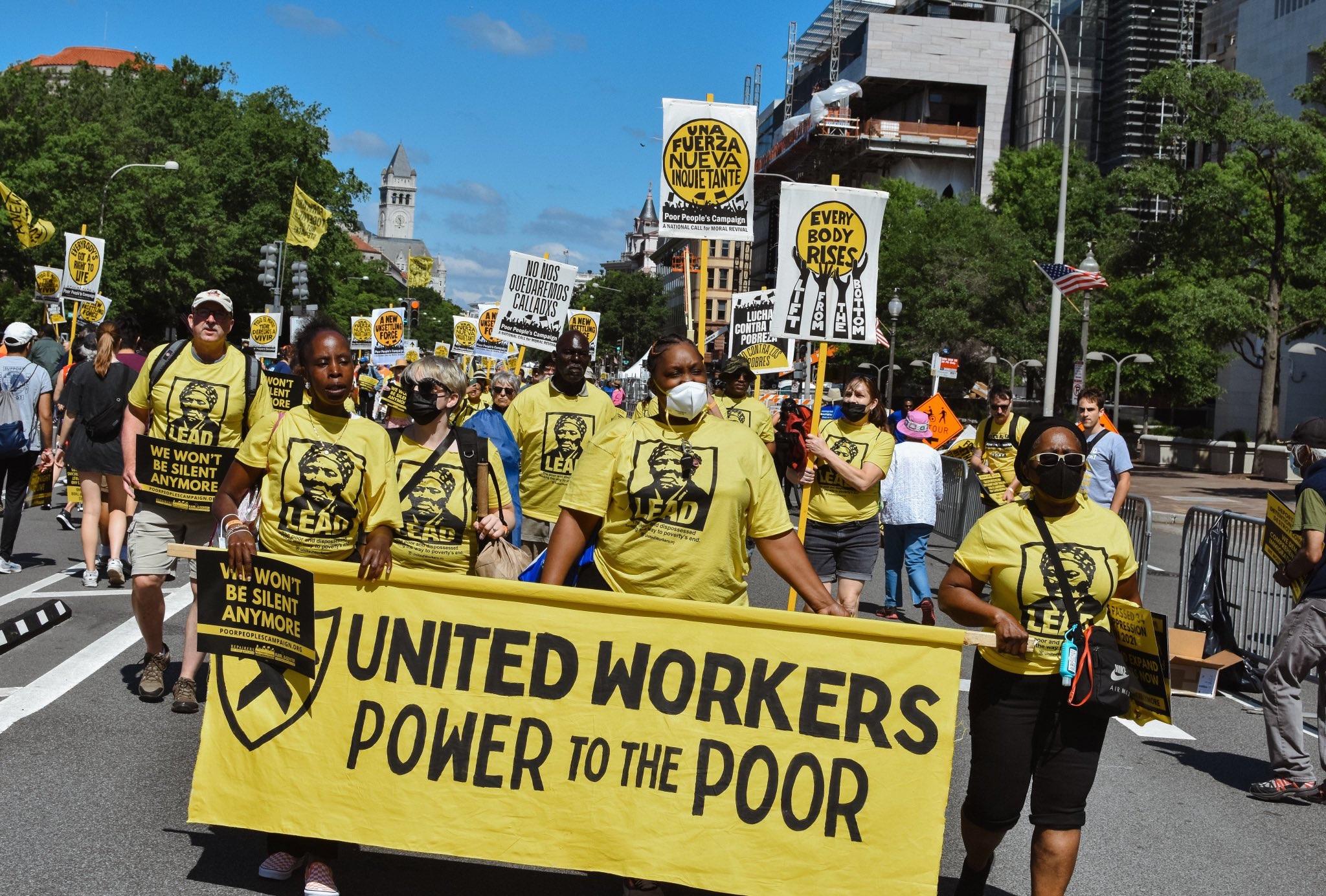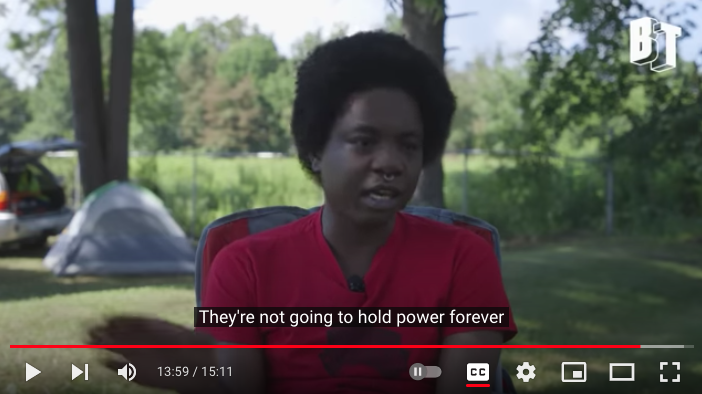By Nijmie Zakkiyyah Dzurinko and Rev. E. West McNeill
As we continue to deepen our study of how the working class has used the tactic of engaging in elections to further a strategy for uniting various social forces and asserting political independence, we are faced with the contradiction that we lack a viable electoral vehicle that represents the interests of the 140 million poor and dispossessed people in the U.S. Yet, as John Keller’s article asserts, we are in a moment of potential political polarization that we may be able to take advantage of. Our class needs to have our own political experience in order to break with the two parties of capital. This means that the only way out is through.
As we continue through this election season, we have a front row seat into how the ruling class uses the elections to achieve the exact opposite of our strategy – further reinforcing the division and disorganization of our class. For example, Spotlight PA, a nonprofit investigative reporting outlet in Pennsylvania, has entitled the Governor and Senate races: “One vote, two Pennsylvanias.” The implication is that there is a Red and Blue Pennsylvania – each with fundamentally opposing perspectives and interests. The ruling class uses elections to put most people in the frame of mind of a sports team. We’re supposed to love our team and hate the other. But our analysis shows us that this is a false distinction. The state is an instrument of the class that rules, although the parties may represent different wings of the ruling class. Additionally, most Pennsylvanians share common conditions, even if our electoral system is structured to obscure the commonalities.
In the University of the Poor network we are grappling with how to engage in this arena in a way that builds the strength and political independence of our class and avoids the pitfalls of the way that the non-profit industrial complex most often engages in elections. These pitfalls include 1) fear mongering/lesser-evilism, 2) false aggrandizement of personalities, and 3) forgetting our past experience.
Fear mongering presents the parties as a contest between good and evil. Whichever party you’re part of, “the alternative” is “so much worse.” Lesser-evilism is presented as a fait accompli when liberals/progressives attempt to cement allegiance to the Democratic Party. However, for the poor and dispossessed in the U.S. and around the world, as well as for the health of the planet, both parties have done significant harm, aligned as they are around war and global warming. Just because the Republican party is increasingly willing to bring that harm home to roost, we can’t turn away from the fact that even just recent military interventions under Clinton and Obama harmed the working class from Libya to the Balkans. Some of the most drastic measures that harmed the working class and benefited the ruling class in the U.S., such as welfare reform, the “Hope VI” policy that changed public housing as we know it, and the bailout of the banks during the Great Recession, were implemented under Democratic presidents. It’s necessary to build and deepen our connections with the international working class and study national and global history in order to recognize the function of the state in class society.
Another common pitfall we are working to avoid is the false aggrandizement of individuals running for elected office. Again, this is based on a misunderstanding of how change happens – from individual personalities getting into office rather than through mass movements built from below. Because electoral organizing often takes place in a vacuum of deeper leadership development and political education, and without an analysis of the relationship of the tactic to the larger strategy, campaigns become breeding grounds for treating candidates like celebrities, rather than as a means to advance an agenda. (This is exacerbated by the influence of big data, which is further explored below.)
The final pitfall we must avoid in our methodology is that of “forgetting.” If we don’t do the work to critically reflect on past efforts to change the narrative, build our agenda, and impact the electoral terrain, then we are in danger of returning to the same position every two to four years, on a treadmill with no plan to build the offramp. We must make the struggle a school, analyzing the strength and power we have or haven’t gained through engaging in elections, as well as study our enemy and what we are up against. We don’t want to simply forget and be back in the same position over and over again, muddling along because we feel that “there is no alternative.”
Recognizing that much more study, reflection, and discussion is needed to chart our collective course, this piece aims to reflect on some current experiences coming out of struggles of the poor and raise questions we believe must be further explored in the coming period.
Poor People’s Campaign: A National Call for Moral Revival
The Poor People’s Campaign: A National Call for Moral Revival (PPC:NCMR) is one mass campaign cohering many fronts of struggle that is putting forward an analysis of how to understand and engage in elections as a politically independent force oriented around the needs and demands of the poor.
Speaking to the New York Poor People’s Campaign’s People’s Assembly earlier this month, policy director Shailly Gupta Barnes discussed the PPC:NCMR’s concept of itself as “a movement that votes.” In part, this slogan speaks to a recognition that voting and elections are only a facet of building and wielding power for our class. Elections are just one arena of political struggle, but, as our study of history shows, they are a significant one. Barnes highlighted two of the arguments the PPC:NCMR makes for organizing around voting and elections.
First, our engagement with the electoral terrain isn’t just about the elections themselves. A movement that votes has to approach elections as another way to reach and organize the poor into a powerful enough force to be reckoned with. The electoral arena is an area in which huge segments of our class are already participating. “There were 50 million poor and low-income people who cast a ballot in 2020,” Barnes said. “These are huge numbers, and if they are participating in elections, and we aren’t already in touch with them, we need to be where they are. One of these places is at the ballot box.”
Second, the Poor People’s Campaign argues that poor and low-income voters represent a potential voting bloc that could be organized to fundamentally shift the political landscape of the United States and force the state to meaningfully respond to the needs and demands of our class. Waking The Sleeping Giant, the PPC:NCMR report released following the 2020 election, digs into the data around low-income voter engagement, showing both that these voters participated in significant numbers and that increasing low-income voter turnout could shift election outcomes across the country – if these voters are organized to vote together around a common agenda.
In framing its voter registration and get out the vote efforts this year, the PPC:NCMR often says “our votes are not support, they are demands.”
“We don’t say this to be cute or pithy,” Barnes said. “It’s how we have to approach this terrain out of principle, out of commitment to a bigger project, and so as not to get caught up in party politics and to actually remain focused on these issues, regardless of who is in office.”
One of the contradictions we face at this stage is that, with very few exceptions, we don’t yet have the ability to hold elected officials accountable to our demands. When they fail to fight on our behalf – even when we put them into office – because we are out-moneyed and out-mighted by the ruling class, we are not yet organized enough to force concessions or, depending on the cost of the election, easily replace them with someone more sympathetic to our demands. We are not currently in a position to significantly shift the levers of state power, let alone take hold of them ourselves.
But as we continue to build “a movement that votes,” the question of how we can effectively wield electoral power as it grows becomes more pressing. Where will our strengths line up opposite the ruling class’s weaknesses in the electoral arena? How do we understand and position ourselves in relation to the fissures in the two major parties? How do we prioritize electoral work in relation to other critical kinds of organizing? As we grapple with these and other questions, developments in technology and escalating voter suppression will keep the ground shifting beneath our feet.
Alongside our study of history, further study and reflection on the experiences of those in our network is needed as we assess the conditions we face and how we can most effectively use the electoral arena to advance our strategy. There are a variety of efforts being organized around voter engagement and elections that are emerging out of struggles of the poor today. Two examples, from Birmingham and Chicago, offer insight into how organizers are using different approaches in the electoral terrain to build independent political power for the poor.
Greater Birmingham Ministries
In Birmingham, Alabama, Greater Birmingham Ministries (GBM) is an organization that has been doing non-partisan voter registration, education, and mobilization for several decades. GBM was founded in 1969, coming out of the grassroots faith-led organizing of the civil rights movement. GBM’s work is oriented around meeting immediate needs, building community, and systems change, said Rev. Carolyn Foster, tri-chair of the Alabama Poor People’s Campaign and Faith in Community Coordinator for GBM. The latter has always included organizing around voting and elections, especially with poor and low-income people who often first connect with GBM through their direct service programs.
When we spoke to Rev. Foster, GBM had just won a lawsuit against the Alabama Secretary of State and received a list of people with past convictions who were denied voter registration or dropped from Alabama’s voting rolls. This information was public information that should have been provided under the National Voter Registration Act. Many of these people, may indeed be eligible to vote or to have their voting rights restored. GBM is launching a texting campaign to inform them they may be eligible to vote or to have their voting rights restored. GBM is also making connections with directly impacted communities through an ongoing project to restore the right to vote of people on parole. They table twice a week outside a nearby parole office.
“We get to know people and talk to them about restoring their vote, and then when they get to hear us, and we hear them, they’re more open to doing the paperwork and the process,” Rev. Foster said. “That is really the way to do it. Relationship building. That takes time, and that takes work, but that’s what it really takes – going in and building relationships with people who are the forgotten people.”
This election cycle GBM also produced an election guide for Jefferson County, which it mails to its direct service clients and distributes at a wide range of events. GBM’s message to its constituency is to vote not based on party or personality, but on a platform of issues.
Looking ahead, Rev. Foster hopes the organizing she and others are doing in Alabama will lay the groundwork for different kinds of candidates to run and win elected office in the state.
“My fondest dream is to see people elected to these positions of authority and power who are people who came out of the movement, who know what the answers are for poor and low income people, and for vulnerable people who are stuck in these systemic traps, because they came out of it,” Rev. Foster said.
United Neighbors of the 35th Ward
Six hundred fifty miles north of Birmingham, organizers in Chicago are gaining experience in engaging more directly with political campaigns, including campaigning on behalf of candidates and running candidates for office. United Neighbors of the 35th Ward, a neighborhood-based organization in the Northwest of Chicago, is organizing in a context where community activists, progressives and some Democratic Socialists are working to confront the Democratic machine.
UN 35 is an IPO, or independent political organization, representing the 35th ward on Chicago’s northwest side, an area with about 55,000 residents. It was formed in 2015 out of the successful campaign of Carlos Ramirez-Rosa for Alderman. IPOs are a form of organization first envisioned and created by the Harold Washington campaign for mayor of Chicago in 1983 to engage grassroots Chicagoans and counter the power of the Democratic machine. After helping Ramirez-Rosa, a young community organizer, win his Alderman campaign in 2015, a group of community members created United Neighbors of the 35th Ward as an IPO, “so that [Ramirez-Rosa] would have our voice in the City Council, and we would put pressure on him to represent our values and our needs,” said Joyce Brody, a member of UN 35.
“The good thing about IPOs is that [they’re defined as] an independent political organization, and that is super vague. Really you can argue that anything is political, and so that’s exactly what we do,” said Sandra Puebla, the current chairperson of UN 35. “We essentially do whatever we think is something that our community needs.”
This includes year-round door knocking, political education, organizing around issue-based campaigns, and coordinating mutual aid during the pandemic. Where UN 35 is seeing its growing influence most directly, Puebla says, is through its electoral work. From its inception, UN 35 has made endorsements and helped to get out the vote for candidates who align with a vision of empowering poor communities.
“Only one of the dozens and dozens of candidates we’ve endorsed has lost the 35th Ward, and that’s because of the work we’ve done and the trust the community has in us,” Puebla said.
This past summer, UN 35 decided to run a candidate for the first time. Anthony Quezada, a young man who was born and raised in a poor neighborhood of the ward, ran for Cook County Commissioner and defeated a 2-term incumbent in a district that covered parts of 14 different wards. Delia Ramirez, a young progressive community activist who was endorsed by UN35 and is running for Congress, also beat a centrist Democrat with significant resources.
“We were outspent 3 to 1 or 4 to 1 by the end of it. But we won because we have relationships with the communities. We also still made sure that we were hitting the communities that were often ignored, and so we made sure to make connections in the poor neighborhoods. They really showed out for our [endorsed candidates] in a way that was really beautiful to see,” Puebla said.
UN 35’s success is attracting the attention of elected officials and IPOs in other parts of the city, raising the potential of a larger bloc of organizations that could influence city politics on a bigger scale, including the mayor’s race.
At the same time, UN35 is working with other community organizations of poor people to advance their core strategy of organizing and uniting the poor. For example, UN35 worked alongside other community organizations, community leaders, and residents to win a new 100 percent affordable housing building that has just opened in the ward. This is a meaningful victory for this community that is experiencing gentrification, and it has captured the attention of IPOs in other wards that are facing a similar housing crisis.
“We’re not going to win [the battle against gentrification]. We know that. But we are fighting to establish what the poor need, and we are meeting people and building a movement. That’s the whole point,” Brody said.
Because of UN 35’s involvement in establishing this housing complex, the organization will have access to its community room for meetings at any time.
“We haven’t gotten there yet, but we’re looking to establish a base of operations right there in that huge complex that really represents who we are, and that really anchors us with the poor,” Brody said.
Where do we go from here
The work of Greater Birmingham Ministries and United Neighbors of the 35th Ward represents two distinct approaches to engaging with elections – one following a non-partisan model that aligns with the Poor People’s Campaign’s voter registration, education, and GOTV tactics, and the other a more overtly partisan model that recognizes the need to build independent political power while remaining relevant in key Democratic Party races. We assume that both approaches – as well as potentially endorsing or running candidates on independent or third party lines – will continue to play a role in building the power of the poor in the near term. Each raises its own challenges and contradictions, as well as opportunities.
One of the most important questions we must continue to ask within the University of the Poor is how our work in the electoral arena is advancing our mission to “systematically identify and develop leaders committed to the unity of the poor and dispossessed across color lines and other lines of division.” Where and how are we succeeding at leadership development, and how can these lessons be applied in other contexts? How are we pushing against the grain and countering the lesser-evilism, false aggrandizement of individuals, and the forgetting that is so prevalent around us? Conversely, where has our engagement with electoral work presented obstacles to developing and uniting leaders, and what lessons can we draw from those experiences?
Another key part of the University of the Poor’s mission is to seek to understand and respond to changes in the political and economic landscape. An aspect of electoralism that we need to understand more deeply is the relationship of “big data” to the electoral process. Our network is somewhat unique in terms of our estimation of the technological revolution and its impact on every facet of our lives – including throwing human beings completely out of the production process for the first time in history. We have examined the relationship of this revolution in computing and artificial intelligence to many aspects of our lives, but not yet to the electoral terrain.
“Big data” in this case refers to the computational and analytic processes involved in compiling large quantities of information about voters from multiple sources. The outcome of the technological revolution in our political process is that winning elections is approached as a question of data science, and voters are approached as a market. The two corporate parties are identifying their likely voters and targeting them with content that will speak to them. Voters are more atomized than ever before and broken into niche and sub-niche audiences with micro-targeting. Both parties are “selling” ideas to the masses. These ideas are not explored, debated, and deeply understood, but are watch words, taglines, and hashtags that people can identify with. Catch phrases and images are presented as advertisements for particular candidates. In this world of electoral politics, the masses of people do not need to be informed, and parties don’t need to talk to anyone who doesn’t already agree with them. This process is turning elections into an even bigger and more effective engine to divide the working class. Just as the working class isn’t empowered by Amazon, Google and Facebook having troves of data about our individual preferences, we’re not empowered by the targeting of big data around our voting preferences either. The Obama campaign was the first to maximize the use of data analytics in communication, ad buying, and fundraising – ultimately resulting in its ability to raise 1 billion dollars on the path to electoral victory.
Next week the midterms will happen. There is no denying that the outcome could have serious material consequences for our class in the U.S. and around the world and the terrain on which we are organizing. However, we know that this election, like all elections, represents just a skirmish in the broader war. Much more study, experience, and reflection is needed to deepen our understanding of how we can – in line with the Sun Tzu axiom – throw our strength against the enemy’s weakness in the electoral realm. At the University of the Poor we are committed to undertaking this inquiry – combining practice and study. In the words of Amilcar Cabral, we must “tell no lies and claim no easy victories.”
Nijmie Zakkiyyah Dzurinko (she or they) is a working class Black, Indigenous and queer organizer, healer, and strategist of over 20 years from Pennsylvania. She is co-founder of Put People First! PA, a working class, statewide, base building human rights organization waging a healthcare is a human right campaign. They are also a co-chair of the Pennsylvania Poor People’s Campaign: A National Call for Moral Revival.
Rev. E. West McNeill (they/them) is the Executive Director of the Labor-Religion Coalition of New York State and a tri-chair of the New York State Poor People’s Campaign. They are ordained in the United Church of Christ and have over a decade of experience organizing with community, faith, and labor organizations.




[…] guide further study on electoral politics and how revolutionaries can engage with elections. First, Nijmie Dzurinko and Rev. E. West McNeill explore several current experiences in the class struggle as they relate to the electoral arena. Second, in part two of his series on […]
So proud to be involved with both the Poor Peoples Campaign AND multi/denominational, Greater Birmingham Ministries, organizations which represent
human love while empathy is often debased in policy.
Thank you for this insightful and practical argument for independent political organization(s). GBM and UN35 both prioritize our class–the poor. Other respected progressive movement leaders are now speaking about developing a grassroots third party. Some folks like me are wondering what benefits, risks and costs such a third party-building attempt might make for our PPC-NCMR’s independence? Would a third party syphon off the visible and de facto PPC-NCMR support for better Democratic Party policies? or would the PPC-NCMR support even more progressive policies of a new third party that truly prioritizes the needs of the poor? This is not an academic question.